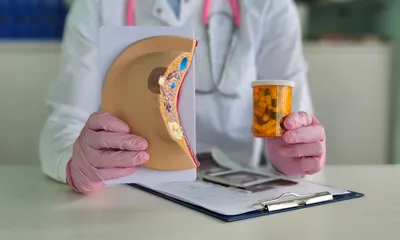Ulcers
-
Description
-
Signs & Symptoms
-
Anatomy
-
Cause
-
Diagnosis
What is an Ulcer?
An ulcer is an open sore that develops either on the wall of a person’s stomach or their lower intestine when peptic acid damages the surface lining of the organs and causes radiating pain plus the possibility of internal bleeding. This occurs when the amount of stomach acid is much greater than the amount of mucus coating the organ lining and for older people it can become a chronic condition that is a source of great discomfort.
There are different types of ulcers. Gastric ulcers are ones where the sore is on the inside of the stomach, and a duodenal ulcer is one found on the inside of the upper part of the small intestine. Ulcers can be easily aggravated by sufferers eating certain types of food or becoming severely dehydrated.
What Causes Ulcers?
The increase in stomach acid and/or decrease in mucus that causes ulcers is most often the result of an H. pylori infection. The bacteria will be in the mucosal layer of the stomach and intestine and promote swelling and irritation of the stomach lining. Regular use of certain pain relievers may also be behind what causes ulcers, and the most notable of them are NSAID non-steroidal anti-inflammatory drugs that are known to irritate and inflame the stomach and intestine lining for some people.
Smoking can increase ulcer risk for people with H. pylori infections, and excessive alcohol consumption can worsen an ulcer. Peptic ulcers have a tendency to become chronic, meaning sufferers often get more of them after they have an ulcer for the first time. Stress can also make an ulcer worse and in rarer instances, women will get them because of osteoporosis treatment medications like alendronate and risedronate.
Ulcer Symptoms
Internal pain radiating from the upper or lower abdomen is always going to be the primary indicator that a person may have an ulcer. For many, the pain of an ulcer is worse at night, and for some people, it is worse after eating. Sufferers may also have heartburn from an ulcer, or experience nausea because of them. Belching and feeling bloated or overly full are also ulcer symptoms, and when a person has a severe peptic ulcer, they may vomit blood or have darkened and bloody stools.
Ulcer Treatment
The most conventional approach to ulcer treatment is to have the person on a proton pump inhibitor medication like Prilosec or Prevacid that is formulated to ensure that there is less digestive acid in the stomach and lower intestine. For people that need to be taking NSAID anti-inflammatories for pain relief, it may be better to take the medications with food if you have an ulcer.
OTC antacids may be used to counter the effects of stomach acid and may provide some relief from ulcer pain in the stomach but will be less effective for a duodenal ulcer. Your doctor may advise temporary dietary changes while you are treating an ulcer, and in some cases, long-term changes may be best if you have chronic peptic ulcers.
Signs & Symptoms
- Radiating abdominal pain
- Heartburn
- Nausea
- Belching
- Bloating
- Vomiting blood
- Dark, bloody stools
Anatomy
- Stomach lining
- Small intestine
- Duodenum
Cause
- H. pylori infection
- Excessive stomach acid
- Decreased mucus production
- Use of NSAID pain relievers
- Smoking
- Excessive alcohol consumption
- Stress
- Certain osteoporosis medications
Diagnosis
- Endoscopy
- H. pylori test
- Barium swallow X-ray
- Stool tests



